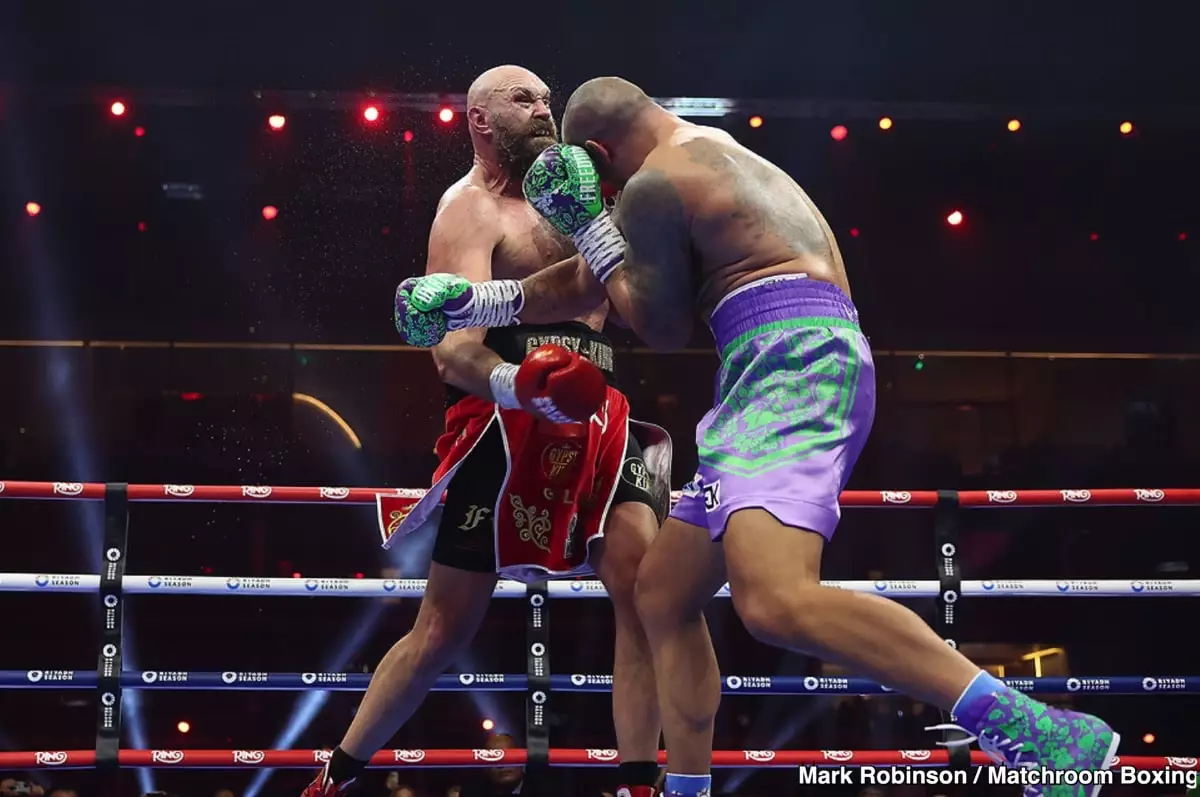In the world of heavyweight boxing, the name Tyson Fury has long been synonymous with bravado, skill, and a larger-than-life persona. However, the recent rematch against Oleksandr Usyk has thrown the spotlight on a more precarious aspect of Fury’s career: the shocking consequences of defeat. Losing for the second time to Usyk, who is hailed as an exceptional talent, Fury made a hasty retreat from the ring, leaving fans and critics alike to ponder the state of his boxing career and what it means for his already complicated legacy.
At 36 years old, with a professional record of 34 wins, 2 losses, and 1 draw, Fury faces a pivotal juncture. His well-known confidence now stands on shaky ground, especially after being bested by a fighter many view as naturally smaller, a point that only exacerbates Fury’s predicament. The immediate post-fight narrative is infused with accusations of being “robbed,” typical fare for any defeated champion seeking solace in perceived injustices. However, as the dust settles, the question arises whether such claims can hold water when framed against his own inability to adapt and overcome.
The discourse surrounding Fury’s legacy became sharper with these latest defeats. Boxing historians often compare fighters across eras, and when juxtaposed against the likes of Muhammad Ali, Joe Louis, and Lennox Lewis, Fury’s credentials feel less substantial. While his victories against Wladimir Klitschko and Deontay Wilder are often heralded as landmarks in his career, the stark reality is that a considerable part of his reputation is now intertwined with losses to Usyk, a fighter he had been expected to outperform. The narrative shifts from one of invincibility to vulnerability, and the implications of these losses will undoubtedly affect how future generations perceive him.
A significant factor in assessing Fury’s legacy is the quality of his opposition. While he did secure victories against highly regarded fighters, the defeats have brought into question the depth of his accomplishments. Does a fighter who loses to a smaller, though exceptionally talented, opponent measure up against the truly greats of the sport? Fury’s character and fighting spirit have been called into question, as the boxing community reflects on whether his previous triumphs were more about the opponents than the fighter himself.
As discussions about retirement gain momentum, one must inquire what drives Fury at this juncture. Will he seek a third bout with Usyk, or perhaps engage in a highly anticipated yet tainted matchup against Anthony Joshua? The idea of a “Battle of the Losers” is unappealing, casting a shadow over any potential bout that would inevitably frame both fighters as remnants of a past golden era. The possibility that Fury would risk further tarnishing his legacy against Joshua—a fighter himself layered with critiques about his past performances—raises questions about his decision-making moving forward.
The financial lure of high-stake fights in boxing is difficult to resist, even for a competitor like Fury. Yet, participating in another bout carries the weight of potential disgrace if he were to lose again. The boxing community’s current sentiment is far from forgiving; even a single loss can eclipse years of hard-fought victories in the eyes of fans and critics. With his reputation at stake, the allure of a comeback must be weighed against whether he is willing to face the possibility of further failure.
As Tyson Fury reflects on his career following this profound defeat, he must confront both the immediate realities of his situation and the long-term implications for his legacy. It is a sobering moment where bravado meets reality, forcing a recalibration of identity for a fighter who has prided himself on being the best. Time will reveal whether we have seen the last of Fury in the ring or if he can reclaim his narrative against formidable opponents. Regardless of what lies ahead, the boxing world will be watching closely, eager to see how one of its most colorful characters navigates the complex post-defeat landscape.

